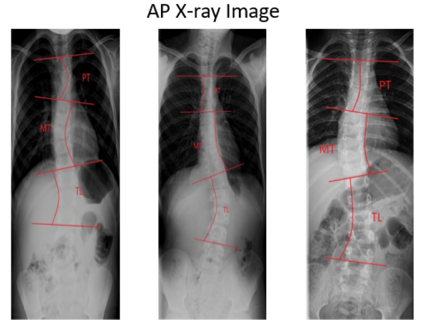
Accurate Automated Spinal Curvature Estimation
MICCAI 2019
The challenge homepage is moved to Grand Challenge, and please check the new homepage now. The test data is released, please check here now. The Leader Board is now opened.
Call for Participant
Accurate automated quantitative estimation of spinal curvature is an important task for the clinical evaluation and treatment planning of Adolescent Idiopathic Scoliosis (AIS). It solves the disadvantage of manual Cobb angle measurement (time-consuming and unreliable) which is the current clinical standard for AIS assessment. A couple of attempts have been made for automated Cobb angle estimation on single-view x-rays. However, it is very challenging to achieve a highly accurate automated estimation of Cobb angles because it is difficult to utilize the information of x-rays efficiently. This, in turn, has sparked specific interest in developing methods for accurate automated spinal curvature estimation and error correction in spinal anterior-posterior x-ray images.[1]
The goal of MICCAI 2019 Challenge on accurate automated spinal curvature estimation and error correction from x-ray images is to investigate (semi-)automatic spinal curvature estimation algorithms and provide a standard evaluation framework with a set of x-ray images. The challenge participating teams (two co-authors in each participating team) will be invited to contribute to a joint journal paper describing and summarizing the challenge outcome, which will be submitted to a high-impact journal in the field. This Challenge is in conjunction and with the support of the 2019 MICCAI Workshop on Computational Methods and Clinical Applications for Spine Imaging.

[1] Wu, H. , Bailey, C. , Rasoulinejad, P. , & Li, S.. Automatic Landmark Estimation for Adolescent Idiopathic Scoliosis Assessment Using BoostNet. MICCAI 2017.
Challenge Dataset
Training data release: Available on the SpineWeb (http://spineweb.digitalimaginggroup.ca/ , Dataset 16)
Test data release:download
Evaluation Criterion
Evaluation metrics will be Cobb angle accuracy.
Important Date
(may change according to the schedule of CSI2019)
- Training data release: Available on the SpineWeb
- Test data release: July 8, 2019
- Paper submission deadline: Aug 20, 2019
Results Submission
Send algorithm output on the test dataset to organizers via email (aasce19@outlook.com).
Paper Submission
Workshop paper
All participants are encouraged to submit a full workshop paper describing their algorithms and results. Manuscript up to 8 pages should follow the template of main conferences’ paper and be submitted via the CSI submission system.
One-page abstract
Participants who cannot finish the task on time are encouraged to complete the task before 6 September 2019, with the one-page abstract submitted to the organizer via email (aasce19@outlook.com). The results on test data should be sent to the organizer for performance evaluation before 1 September 2019.
Challenge ranking
Successful participants with workshop paper will be ranked according the assessment criterion.
Full ranking
A full ranking list including all the participants who completed the spine curvature estimation task, with either workshop paper or one-page abstract, will also be announced during the workshop.
Award and Publication
- Multiple awards will be selected according to the ranking list of all participants.
- Selected challenge papers will be published with the CSI proceedings in Lecture Notes in Computer Science, Springer.
- A potential publication in MedIA which summarizes the benchmarked algorithms will be completed and all participants share the credit.
Organizer
Shuo Li (slishuo@gmail.com), Western University, ON, Canada Wang (lswang@xmu.edu.cn), Xiamen University, China
For any questions about the challenge, feel free to contact.